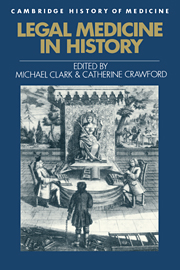Book contents
- Frontmatter
- Contents
- Notes on contributors
- Preface
- Introduction
- I Early modern practice
- II The growth of a science
- III Special offenders
- 7 ‘I answer as a physician’: opinion as fact in pre-McNaughtan insanity trials
- 8 Understanding the terrorist: anarchism, medicine and politics in fin-de-siècle France
- 9 Malingerers, the ‘weakminded’ criminal and the ‘moral imbecile’: how the English prison medical officer became an expert in mental deficiency, 1880–1930
- IV The politics of post-mortems
- V Medical authority in question
- Index
- Cambridge History of Medicine
9 - Malingerers, the ‘weakminded’ criminal and the ‘moral imbecile’: how the English prison medical officer became an expert in mental deficiency, 1880–1930
from III - Special offenders
Published online by Cambridge University Press: 08 January 2010
- Frontmatter
- Contents
- Notes on contributors
- Preface
- Introduction
- I Early modern practice
- II The growth of a science
- III Special offenders
- 7 ‘I answer as a physician’: opinion as fact in pre-McNaughtan insanity trials
- 8 Understanding the terrorist: anarchism, medicine and politics in fin-de-siècle France
- 9 Malingerers, the ‘weakminded’ criminal and the ‘moral imbecile’: how the English prison medical officer became an expert in mental deficiency, 1880–1930
- IV The politics of post-mortems
- V Medical authority in question
- Index
- Cambridge History of Medicine
Summary
The Mental Deficiency Act of 1913 which followed the Report of the Royal Commission of Inquiry into the Care and Control of the Feeble-Minded (1904–8) contained a clause describing a type of mental deficiency called ‘moral imbecility’. It stated that ‘moral imbeciles’ or ‘persons who from an early age display some permanent mental defect coupled with strong vicious or criminal propensities on which punishment has had little or no deterrent effect’ were now to be dealt with in special institutions to be created under the Act, rather than in prisons. English prison medical officers (hereafter prison MOs) regarded themselves as experts in diagnosing such cases of moral defect, and claimed that their expertise was based on their experience of observing prisoners in the normal course of their duties. In this chapter, I shall argue that this knowledge of the mentally deficient criminal was a product of routine procedures for observing, classifying and segregating prisoners that had existed from approximately the mid-nineteenth century. To demonstrate this, I shall concentrate on three aspects of the prison MO's expertise: his duty to supervise punishment, his use of techniques of observation, and his use of criminal records in constructing case-histories of mentally deficient or ‘weak-minded’ criminals.
In structuring the essay in this way I am, of course, giving priority to a study of the relationship between techniques of control employed in the prison and the production of psychiatric and criminological knowledge.
- Type
- Chapter
- Information
- Legal Medicine in History , pp. 223 - 242Publisher: Cambridge University PressPrint publication year: 1994
- 2
- Cited by



